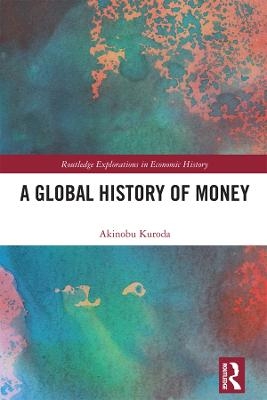
A Global History of Money
Seiten
2020
Routledge (Verlag)
978-0-367-85923-7 (ISBN)
Routledge (Verlag)
978-0-367-85923-7 (ISBN)
Looking at the eleventh century to the twentieth century, Kuroda explores how money was used and how currencies evolved in transactions within local communities and in broader trade networks. The discussion covers Asia, Europe and Africa, and highlights an impressive global interconnectedness in the pre-modern era as well as the modern age.
Looking from the 11th century to the 20th century, Kuroda explores how money was used and how currencies evolved in transactions within local communities and in broader trade networks. The discussion covers Asia, Europe and Africa and highlights an impressive global interconnectedness in the pre-modern era as well as the modern age.
Drawing on a remarkable range of primary and secondary sources, Kuroda reveals that cash transactions were not confined to dealings between people occupying different roles in the division of labour (for example shopkeepers and farmers), rather that peasants were in fact great users of cash, even in transactions between themselves. The book presents a new categorization framework for aligning exchange transactions with money usage choices.
This fascinating monograph will be of great interest to advanced students and researchers of economic history, financial history, global history and monetary studies.
Looking from the 11th century to the 20th century, Kuroda explores how money was used and how currencies evolved in transactions within local communities and in broader trade networks. The discussion covers Asia, Europe and Africa and highlights an impressive global interconnectedness in the pre-modern era as well as the modern age.
Drawing on a remarkable range of primary and secondary sources, Kuroda reveals that cash transactions were not confined to dealings between people occupying different roles in the division of labour (for example shopkeepers and farmers), rather that peasants were in fact great users of cash, even in transactions between themselves. The book presents a new categorization framework for aligning exchange transactions with money usage choices.
This fascinating monograph will be of great interest to advanced students and researchers of economic history, financial history, global history and monetary studies.
Akinobu Kuroda is Professor of East Asian History at the University of Tokyo, Japan. His research covers comparative studies of monetary history in East Asia, India, Africa and Europe, as well as specific studies of China's monetary history.
Introduction Part 1 Exchanges Generate Money Locally 1. Peasants, Marketplace, and Money 2. Stagnant Currencies and Stratified Markets Part 2 A Global History of Monetary Delocalization 3. The Ignition of Monetary Delocalization: An Unexpected Remnant of the Mongolian Regime, c.1300 4. The World Diversified and Stratified: Three Paths after the Global Silver March, c.1600 5. Nationalised Money: The Backstage of the International Gold Standard Regime, c.1900 Conclusion: Money as a Social Circuit
| Erscheinungsdatum | 14.04.2020 |
|---|---|
| Reihe/Serie | Routledge Explorations in Economic History |
| Zusatzinfo | 13 Tables, black and white; 35 Line drawings, black and white; 35 Illustrations, black and white |
| Verlagsort | London |
| Sprache | englisch |
| Maße | 156 x 234 mm |
| Gewicht | 453 g |
| Themenwelt | Geisteswissenschaften ► Geschichte ► Allgemeine Geschichte |
| Geschichte ► Teilgebiete der Geschichte ► Wirtschaftsgeschichte | |
| Wirtschaft ► Betriebswirtschaft / Management | |
| Wirtschaft ► Volkswirtschaftslehre ► Finanzwissenschaft | |
| Wirtschaft ► Volkswirtschaftslehre ► Makroökonomie | |
| ISBN-10 | 0-367-85923-8 / 0367859238 |
| ISBN-13 | 978-0-367-85923-7 / 9780367859237 |
| Zustand | Neuware |
| Haben Sie eine Frage zum Produkt? |
Mehr entdecken
aus dem Bereich
aus dem Bereich
eine Globalgeschichte des Kapitalismus
Buch | Hardcover (2023)
C.H.Beck (Verlag)
CHF 53,20


